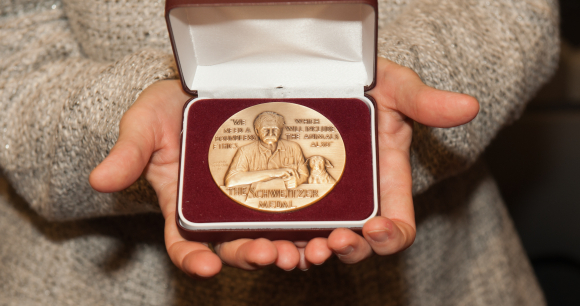
Animal Welfare Institute Honors University of Washington Professor for Work to Combat Wildlife Trafficking
Washington, DC—Dr. Samuel K Wasser, acknowledged worldwide for developing noninvasive tools for monitoring human impacts on wildlife, was honored today with the Albert Schweitzer Medal. This prestigious award, established in 1951 by the Animal Welfare Institute (AWI), recognizes outstanding achievement in the advancement of animal welfare. Senator Maria Cantwell (D-WA) presented the medal to Dr. Wasser during a ceremony held this evening at the Dirksen Senate Office Building.
“Dr. Wasser’s groundbreaking work has paved the way for remarkable strides in the fight against wildlife trafficking, especially ivory trade,” said Cathy Liss, AWI president. “The Animal Welfare Institute feels privileged to have this opportunity to acknowledge his accomplishments with the Albert Schweitzer Medal.”
Dr. Wasser has pioneered noninvasive methods to measure the abundance, distribution and physiological condition of wildlife from their feces, relying on detection dogs to locate these samples over large wilderness areas. He uses these methods to address diverse conservation questions, including impacts of poaching, oil development and overfishing on the well-being of multiple endangered wildlife populations. He also applies these tools to forensic analyses of transnational wildlife crime.
“Dr. Samuel K Wasser has been instrumental in safeguarding key protections for some of the world’s most vulnerable animal populations. At every chance, he has fought for endangered animals, and in each case, he has made significant contributions to wildlife conservation efforts around the globe,” said Senator Cantwell. “We cannot thank Dr. Wasser enough for all he has done and will do to advance global conservation efforts and fight back against poaching.”
Most notably, Dr. Wasser used elephant dung to assemble a DNA reference map of elephants across Africa, which is now widely used to determine the geographic origins of poached ivory. By comparing genotyped ivory to this reference map, he has been able to identify Africa’s largest elephant poaching hotspots, track the number and connectivity of major ivory traffickers operating in Africa, and uncover strategies that transnational organized crime syndicates use to acquire and move their contraband around the world.
This work has led to prosecutions of major transnational ivory traffickers and nurtured key collaborations with the International Consortium on Combating Wildlife Crime, INTERPOL, US Homeland Security Investigations, the US Task Force on Wildlife Trafficking, the US Fish and Wildlife Service, the US Department of State, and wildlife authorities in numerous source and transit countries across Africa and Asia.
"I started working in Africa when I was 19 years old because I loved animals. That was 1973. Since then, I have watched the rising toll that overconsumption, habitat destruction and poaching has had on the world’s most spectacular terrestrial and marine organisms,” said Dr. Wasser. “I was unable to just stand by, and my life’s mission became developing and applying noninvasive methods to uncover these human impacts, show them to the world, and offer solutions for change. I am deeply honored to have those efforts now be acknowledged by receipt of the Albert Schweitzer Award."
Dr. Wasser currently holds the endowed chair in Conservation Biology at the University of Washington, where he is a professor in the Department of Biology and director of the Center for Conservation Biology.
In 1951, Dr. Albert Schweitzer, a famed scientist and humanitarian internationally known for his philosophy focused on the value of all living things, gave AWI permission to strike this medal in his honor. More information about the award can be found at https://awionline.org/content/schweitzer-medalists.
For information on how to obtain photographs of the award ceremony, please contact [email protected] or call (202) 337-2332.
About the Albert Schweitzer Medal
Dr. Albert Schweitzer was a famed scientist and humanitarian internationally known for his philosophy focused on the value of all living things. In 1951, he gave permission to the Animal Welfare Institute to strike a medal in his honor, to be awarded to individuals in recognition of their exemplary efforts to improve the lives of animals. In December 1953, a gold replica of the medal was presented to Dr. Schweitzer by Dr. Charles Joy in Oslo, Norway, where Dr. Schweitzer had gone to accept the Nobel Peace Prize. For over 60 years, the Albert Schweitzer Medal has been a symbol of outstanding achievement in the advancement of animal welfare. For more information and a full list of previous winners, please visit https://awionline.org/content/schweitzer-medalists.